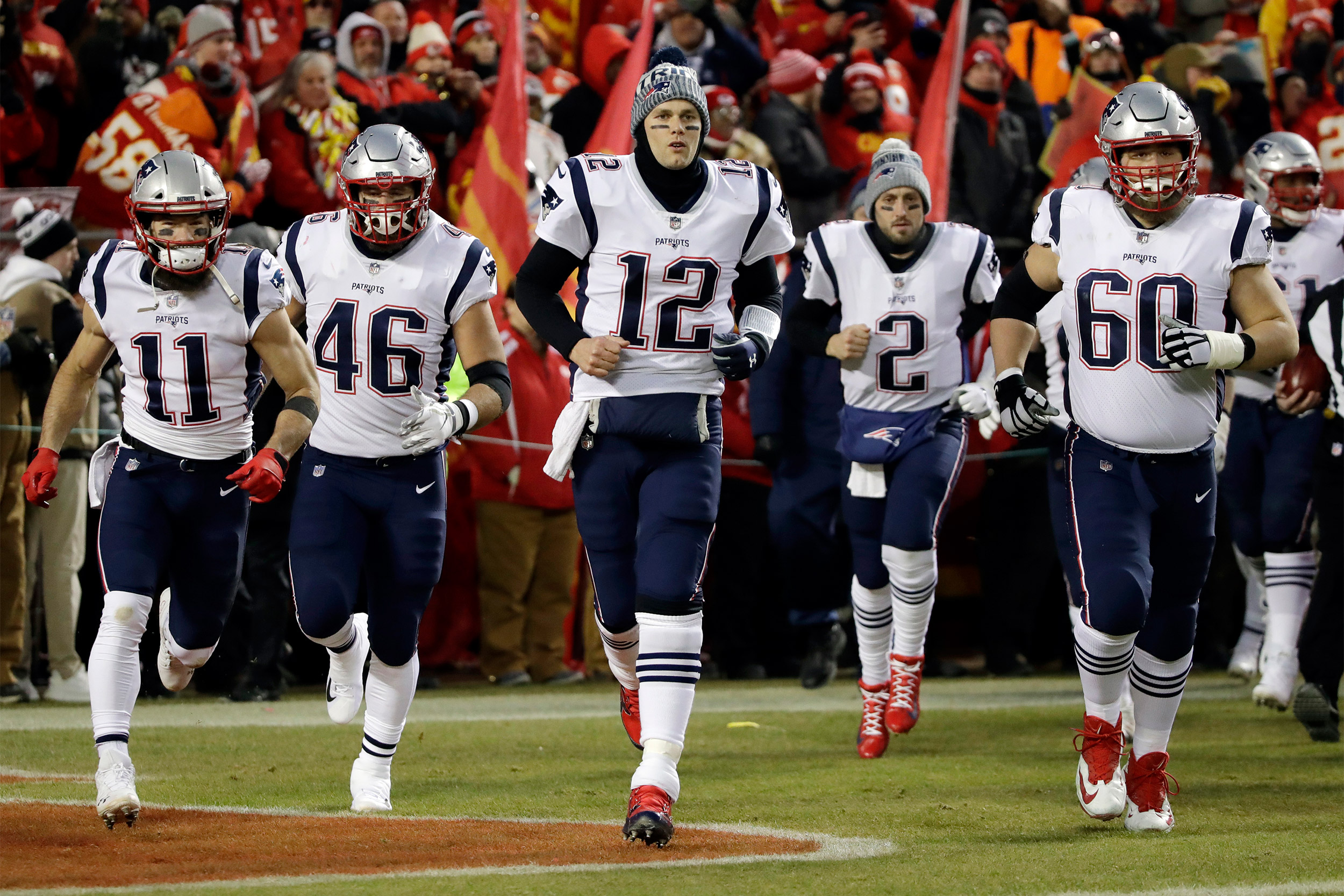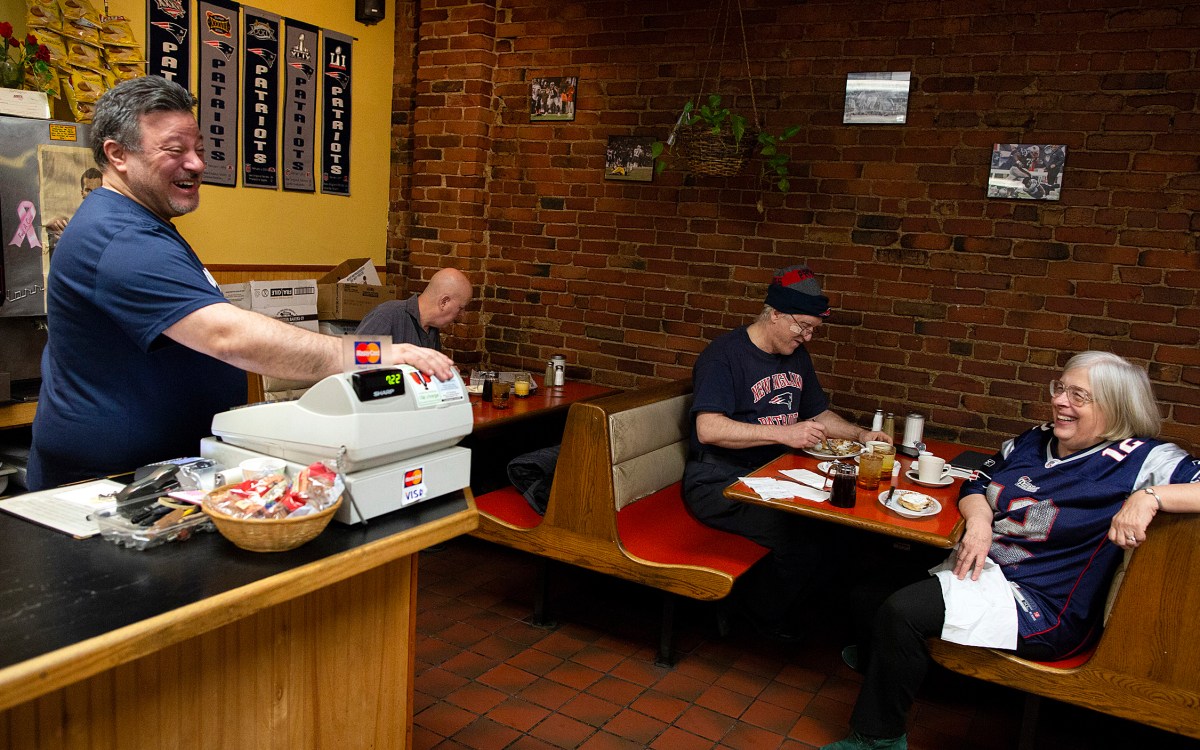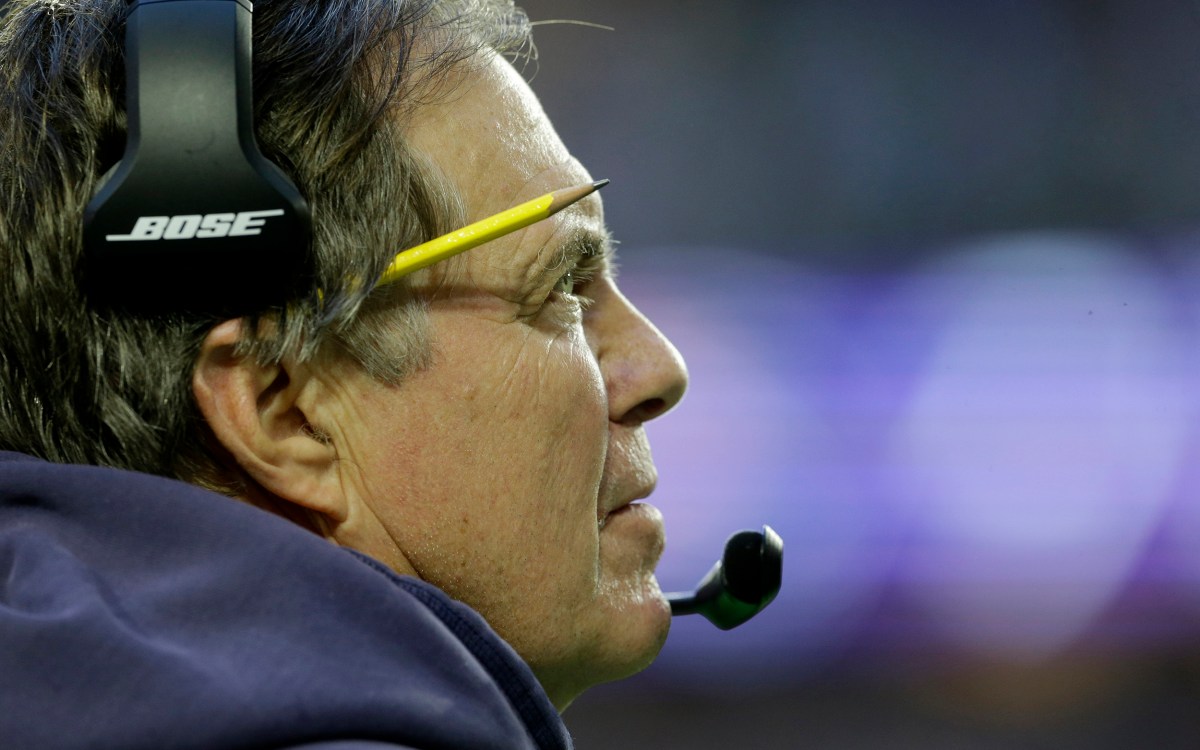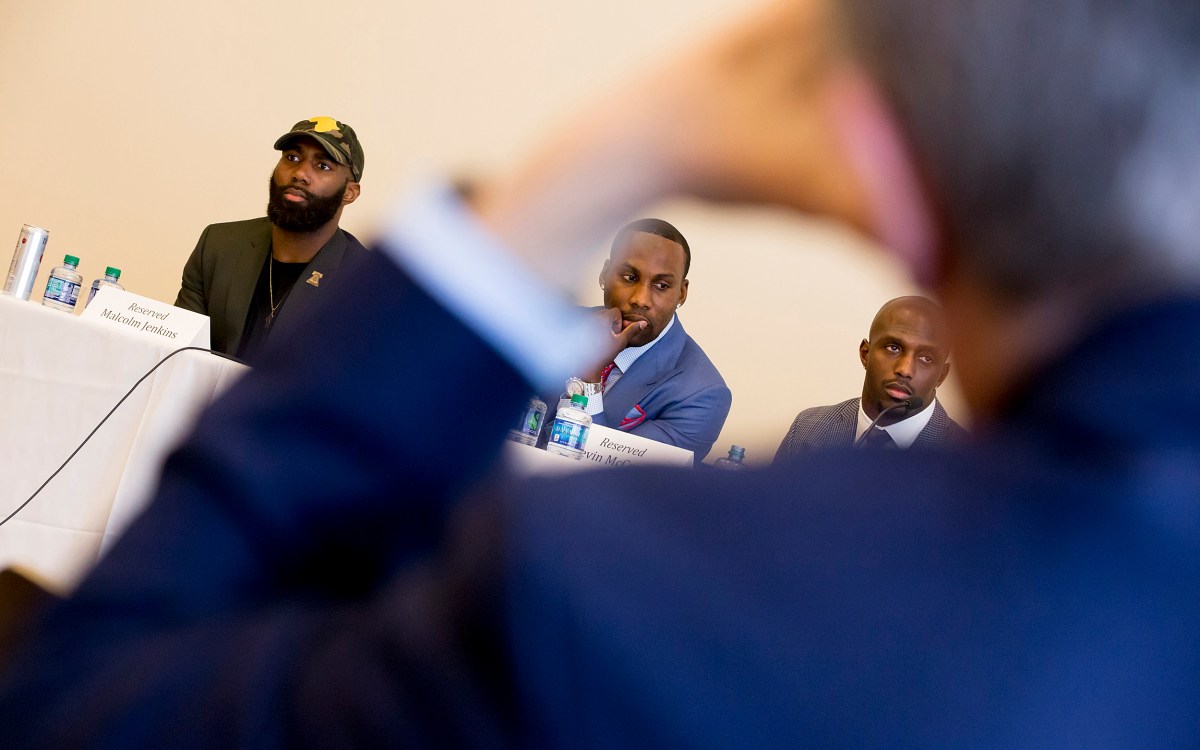
Patriots quarterback Tom Brady [12] leads his team onto the field for Sunday’s AFC Championship game against the Kansas City Chiefs.
AP photo
An inside look at the powerful, porous NFL
Author reflects on what drives the league, what undercuts it — and how the Pats will finish
“‘Politics has become a much bigger subject than the Super Bowl,’ [President] Trump boasted in the run-up to the big game. ‘This is usually Super Bowl territory, and now they’re saying that the politics is more interesting to people,’ he said. ‘So that’s good.’”
— Mark Leibovich, writing in The New York Times Magazine last Aug. 28
As a club of rich businesspeople and lucky heirs operating a billion-dollar cash cow, the last thing that team owners in the National Football League (NFL) wanted was to be swept into a political maelstrom, with the president pressing them to punish players who protested violence against African-Americans by kneeling during the national anthem.
But that’s exactly what happened in 2017 and 2018 when President Trump seized on the protests, brought into the national spotlight by then-San Francisco 49ers quarterback Colin Kaepernick in 2016. Trump’s efforts both galvanized his supporters and unsettled the NFL, which had rejected his attempts to become an owner, beginning in the late ’80s and continuing through 2014, when Trump wanted to buy the Buffalo Bills.
Yet as much as the owners tried to keep politics away from the pigskin, Mark Leibovich, a longtime political writer for The New York Times, wasn’t surprised that effort failed. Best known for his 2013 best-seller “This Town,” a sharply funny look at smug, self-aggrandizing denizens of the nation’s capital, Leibovich took a break from politics to study New England Patriots star quarterback Tom Brady and the NFL’s inner workings for his latest book, “Big Game: The NFL in Dangerous Times.”
Leibovich will visit the JFK Jr. Forum at Harvard Kennedy School Tuesday evening to discuss the politics and business of the NFL.
A lifelong Patriots fan from Newton, Mass., Leibovich spoke with the Gazette about his experiences as an outsider trying to pierce the NFL’s tightly controlled corporate “shield.” He also discussed the future of the sport and how Patriots fans may be contributing to the hatred directed at the team by other fan bases, the media, and some team owners.
Q&A
Mark Leibovich
GAZETTE: Has your impression of the NFL changed from when you looked at it as a fan versus now, after you’ve seen the inner workings?
LEIBOVICH: I certainly learned stuff about the league that I didn’t particularly admire, especially some of the people who run it and own it. I thought that there’s not a lot of real forward or courageous thinking going on at the highest levels of the league. I think there are some real moral and existential issues that they have to grapple with, or should grapple with, around health and safety and a lot of greed. A lot of the owners who I spent time with were not the most savory group I’ve ever been around. But having said that, the game does still seem to survive in spite of the people who run it. And I still have whatever addiction it is.
I think the game has a way of regenerating and putting the focus back on not just the field of play, but also the little “reality TV shows” that seem to sprout up around the NFL all the time. Now all anyone is talking about is “Should they replay the New Orleans-L.A. [NFC championship] game?” I personally think they should. That’d be a lot of fun. The game endures; it’s a great game; it’s perfect for television; it’s perfectly attuned to the psyche of America circa 2019, and here we are.
GAZETTE: You wrote lengthy profiles of both Brady in January 2015 and his Deflategate nemesis, NFL commissioner Roger Goodell, a year later. What was that like? Was there real animosity between the two, or was that overstated?
LEIBOVICH: I think it’s real animosity. I think Tom legitimately got screwed in that deal. The time I spent with him was all leading up to that. It was that season, and then I got a few conversations with him after the you-know-what hit the fan. They’re both athletes in their own way. Goodell is sort of a corporate athlete. He’s a terrible person to interview. He’s very controlled and doesn’t give you much. But if you think about it in terms of reality TV, this was a great TV show for the offseason of 2015‒2016, and it was one of the big sports stories in the country at a time when there were no games. It was, I think, the stupidest sports scandal in history.
GAZETTE: How much of Goodell’s zeal in pursuing punishment against Brady and the Patriots over something the league’s own investigation couldn’t prove might have been to ingratiate himself to the owners who detest the franchise, after Goodell’s handling of the Ray Rice and Adrian Peterson domestic-violence incidents, among other PR mishaps?
LEIBOVICH: Yes, exactly. One of the reasons I wanted to do this book was it was an escape from politics. But you realize pretty early on that there’s no escaping politics inside the NFL. Roger Goodell, if nothing else, is a politician. He’s sort of like a Senate majority leader who has to keep 50 senators happy. All Goodell has to do is keep 32 billionaires happy and he’s going to keep his job and get paid insane amounts of money to do it. So yeah, appealing to an anti-Patriots strain within the NFL among owners is a pretty easy political move, and that’s what he did.
GAZETTE: After several years of self-inflicted scandals and PR problems — including revelations about the pervasiveness of traumatic brain injuries for players, declining TV ratings in 2016 and 2017, and, more recently, the controversy over players kneeling during the national anthem — ratings soared last weekend for the conference championship games. What’s the state of the NFL now?
LEIBOVICH: Insomuch as they will always measure the state of the league in terms of profits and ratings points, I mean, sure. They’ve had a good year. But if you measure the state of the league in terms of the bad will it generates around the country, despite how obsessed people are, there’s a whole lot of people who do not like the NFL. Many of them live in New Orleans this week. But there are large groups of people who root
for many different teams who have very real grievances against the league — not to mention parents of kids who are at terrible risk, and there are a lot of very real existential issues around health and safety and youth sports leagues not getting insurance — to put behind them. There’s just a lot they’re going to have to work out. But in the short term, Americans love a good TV show and a good drama. So I guess the numbers that they care about, which are how much money they’re going to get out of this, they can feel good about. Insomuch as the owners are generally very old, mostly men, who are going to maximize their already ridiculous wealth by whatever ratings points they achieve this year, that’s their short-term thinking.
I don’t think football is going to go away and die. But I do think when you look at how younger people are turning away from sitting around and watching football on TV on weekends, it’s a very different entertainment landscape that we have. If you were looking to the future, something like the NBA or even soccer has much bigger room to grow, and there’s not the same amount of bad will there as toward the NFL, so I think that’s a problem.
GAZETTE: What’s similar and what’s different about writing and covering politics as opposed to football? In many ways, it seems like a lot of the access issues, the horse trading, the thirstiness, goes on in both. What was your impression?
LEIBOVICH: It was more similar than I would have anticipated. Ultimately, there are a lot of the same fragile egos, money, power, and control — control from a journalistic standpoint, control over the story. You mentioned access. Access is a big deal. They don’t need me, but at the same time I do think that everyone, whether in politics or sports, feels like they have a story to tell, and they want to tell it as best they can. And in some ways, I was dangerous to people inside the NFL because I was not telling any kind of official story. I was an outsider. To some degree, it’s always important to try to position yourself as an outsider because otherwise you get so cozy and so steeped in the conventional wisdom. You just don’t want to be part of the club. In that regard, it was an easy inside/outside game for both. But, look, it’s basically the same tension between people wanting to tell their story in a certain way and a reporter trying to write something that more closely approximates the truth.
GAZETTE: Why were team owners so easily rattled by Trump’s attacks on the league over players who protested police violence against African-Americans? They acted like they weren’t a bunch of millionaires who controlled the country’s most popular sport.
LEIBOVICH: It was pathetic to watch. I think what the owners were rattled by is that Donald Trump, for better or for worse, has the ability to control a pretty large segment of the population. His base is, say, 30 or 40 percent of the population, and many of these are older, white men, and that overlaps pretty big with football watchers. The NFL, unlike Trump, cannot just play to its base. The NFL needs everybody — it needs Democrats, Republicans, men, women, Hispanics. You have this very bizarre situation where a president who has personal history with the league — NFL owners have never wanted Donald Trump to be part of their club — all of a sudden has the bully pulpit of the White House, and his Twitter feed. And all of a sudden he can be this puppeteer and drive these people who wanted no part of him crazy. Trump loves that. The owners just had no clue. You just sensed that these people had no power, and even though they were printing money in their league, they were reduced to blithering.
GAZETTE: Is that “culture war” issue over, or could the president revive it?
LEIBOVICH: I think Trump could revive it at any minute. I’m actually sort of surprised that he didn’t make it more of an issue this season, coinciding with the midterm elections. I think one of the best things the NFL had going for it this year was that Trump was preoccupied with the midterms, and now the shutdown, and he just decided to move on. And the league, obviously, was thrilled with that.
GAZETTE: You had to step away from covering politics full-time for a few years to write “Big Game.” Given how news-making and chaotic the Trump era has been, do you regret that decision? Did you ever feel like you missed your shot to write the first “Fire and Fury”?
LEIBOVICH: No, I would drive myself crazy if I thought about all the books I could have written. The truth is people come up to me and say, “Wow, this is the biggest, greatest political story ever. You must be completely in heaven!” The first year of the Trump administration I was mostly focused on writing the book, and clearly I missed out on some big stories. But at the same time, I don’t find it as fun or as edifying as others might. I find a lot of it pretty depressing. It wasn’t as terrible a time to be walking away from politics as you might have thought. Good for Michael Wolff, he wrote “Fire and Fury,” one of the many books I wish I had written and thought of at the time.
GAZETTE: Will you revisit the subject, or has the tone change in D.C. made that critique off-key?
LEIBOVICH: I’m actually thinking of revisiting that. That’s an ongoing question. Certainly, the swamp hasn’t been drained. We have this reality TV show going on right in the middle of everything, which is just weird. But if you walk around D.C., it’s the same — a very, very prosperous, very, very cozy city. And K Street is doing very well. It’s an incredibly affluent and prosperous part of the country right now. Whatever pain is being inflicted on the D.C. area is coming pretty directly from the [government] shutdown-related stuff right now, which is huge. But also, part of it is karmic pain. What’s happening here is just so unprecedented, it’s very unpalatable in many ways. There’s corruption, there’s potential crimes. It’s pretty serious stuff beyond the giggles of the reality show.
GAZETTE: You are a lifelong Patriots fan, who goes back to the Schaefer Stadium, Jim Plunkett days, when the franchise was so abysmal it was blacked out on local TV because it couldn’t fill the stands.
LEIBOVICH: Yeah, I didn’t go to many games. I think I went twice to Schaefer Stadium. That was my age. They were bad.
GAZETTE: Is there a part of you that misses rooting for that sad underdog, or are you happy with all the Lombardi trophies?
LEIBOVICH: First of all, I definitely do miss the Patriots’ old uniforms and the old helmets. I loved that helmet. Insomuch as I own any paraphernalia, it’s always the old logo instead of the new logo. That is one thing I miss.
There’s definitely some real bad will toward the Pats, and it’s not entirely jealousy. I think a lot of it is arrogance, and we’re not the most likable group of fans in America, I would say. I try to be self-aware about that. I do think that on a whole it’s an incredible privilege to be able to sit and watch these playoff games. Even when they lose, it’s a great story. We’re just so spoiled, and it’s going to end soon, or one day.
GAZETTE: OK, what’s your Super Bowl prediction?
LEIBOVICH: I was actually thinking about this. In the eight Super Bowls the Patriots have played this century, the margin has never been more than a touchdown, so I think it’ll probably be close. I will say that the Pats will win 33 to 31, how’s that?
GAZETTE: And how long does Brady keep playing?
LEIBOVICH: Until he’s 45 years old. He’s 41 now. I just sounded much more definitive and specific than I thought. But I figured if I sounded definitive and specific, I’d have much more authority [laughs].
The interview has been edited for clarity and length.







